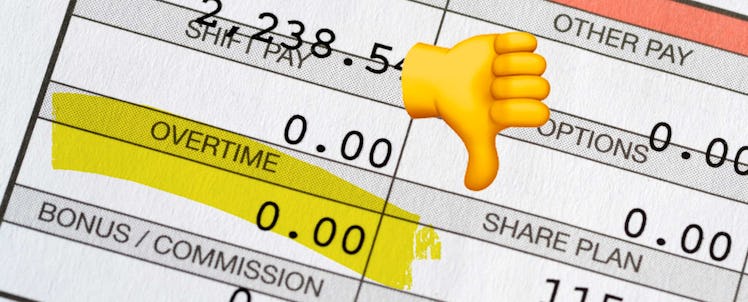Trump’s Overtime Rule Madness Is a Disaster for the Middle Class
In order for American workers to get better wages — either by guaranteeing them overtime or a greater rate of pay — the salary threshold must be raised.

The concept of overtime isn’t complicated: When an employee works more than an agreed upon number of hours, employers are obligated to pay additional money. This ensure that’s employers can’t pressure their workers into indentured servitude. Simple. Because this has been historically uncontroversial — excluding that bit where Pinkerton private police got chiropractic on coal miners’ heads — protections have been enforced in America since 1938. But meaningful worker protection has lately been rendered all but impossible due to updates to federal law stipulating that only the 7 percent of full-time American workers making $24,000 a year or less must be guaranteed overtime. The salary threshold is just one but a few tests that mark whether or not someone should be paid overtime: an employee who makes north of the aforementioned salary threshold of $24,000 a year, is paid on a salaried basis, and passes a test of duties in the workplace like if managing others or having complex duties, is not qualified to receive overtime pay. This functionally means that the majority of American workers, who make north of $24,000 a year, do not need to be paid overtime regardless of their schedules.
Experts agree that the best way to guarantee better pay for America’s middle class is to raise the salary threshold. States have responded in kind and have stepped in to fill the legal gap and guarantee a living wage in cities where $24,000 doesn’t cut it — like New York and California have, unsurprisingly, led the charge — the average American business now has more leverage over the average American worker than has been historically considered tenable. The Trump administration was given the opportunity to step in on behalf of American workers last week by supporting an Obama-era rule 2016 that temporarily placed the overtime salary threshold at $47,000 a year, with an automatic increase every three years. Instead, the president refused to defend the rule in court, opting to settle for a paltry $35,000 a year.
The result? Supposedly middle-class American workers will be stuck working overtime while being paid crackers and working parents will be forced to invest more in unaffordable child care. More broadly, this means that employers will not be forced to reckon with the realities of the modern workplace. Bosses will be able to demand emails be answered late at night and that presentations be turned in bright and early in the morning. In so much as trickle-down economics never work out, trickle-up workplace norms tend to define office culture. So even well-paid employees are likely to lose out when the government abdicates is role protecting workers.
In the context of inflation and wage stagnation — if tracked for inflation, the overtime exemption should actually be more than $55,000 a year — this is a scandal. In the 1970s, over 60 percent of American workers were eligible for overtime. If the Trump administration adopted Obama-era rules, paid overtime would be offered to an additional three million people of color, 4.7 million workers who only have a high school degree, and 2.7 million parents of minors — roughly eight million Americans all in. Instead, only 7 percent will be eligible. That works out to about $1.2 billion a year in money workers won’t get under the Trump rule.
For working parents, who are offered few of the protections available to caregivers in most developed countries, this is a disaster.
Here’s the truth: American workers are working more hours than ever before. We work about 390 more hours a year than the average worker did in the 1970s and we are not compensated for that work. If there are no consequences to asking a large swathe of underpaid American workers to work overtime — a significant percentage of whom are forced to negotiate child care needs — parents in particular will find themselves without recourse as they shoulder an ever-increasing burden without seeing an benefit for themselves or for their children.
At this point, the notion that Trump is a strong supporter of American workers is fairly laughable. Though the economy has been strong over the last several years (emphasis on the past tense) workers are scrambling to keep up with costs. Meanwhile, Trump and his party have done next to nothing to intercede on behalf of a harried workforce. But parents can do math and if the trend continues many are likely to drop out of the work force over the coming years. That won’t be good for the economy and, depending on the situation, may not be good for the parents either.
The solution is to follow historical precedent. The solution is for the government to intercede. Shrinking government doesn’t work so well when the folks writing workers’ checks get so big they can behave with impunity.
This article was originally published on